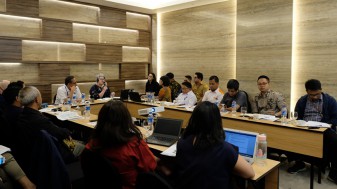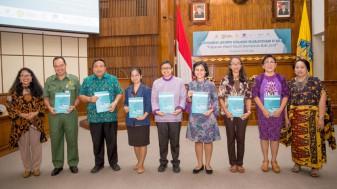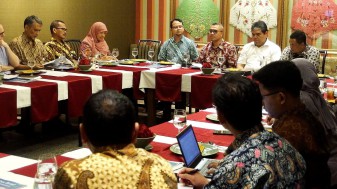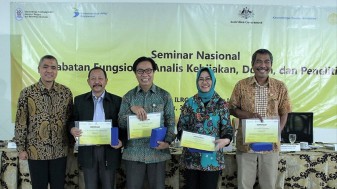To promote knowledge-based policy, research outcomes need to be communicated with stakeholders. Communicating research is not only necessary when the research results are ready, but also from the planning process to make its findings and recommendations easier to understand.
This was one of the conclusions from the discussion in the KSIxChange#33 event, themed "Challenge and Recommendation in Communicating Social Humanities Research for Policy Development," which was held online, Tuesday (25/5). Hosted by Knowledge Sector Initiative (KSI), this event was attended by the Director of Spatial Planning and Disaster Management of the Ministry of National Development Planning/National Development Planning Agency (Bappenas), Sumedi Andono Mulyo, Director of Research of the Centre for Islamic and Community Studies (PPIM) of the Jakarta National Islamic University, Didin Syafruddin, Executive Director of SurveyMETER, Ni Wayan Suriastini, and Editor-in-Chief of The Conversation Indonesia, Ika Krismantari, as speakers. Meanwhile, the moderator for the discussion broadcasted on the Asumsi Youtube channel was the Head of KSI’s Knowledge Exchange and Learning (KEL), Primatia R Wulandari.
The Director of Spatial Planning and Disaster Management of Bappenas, Sumedi Andono Mulyo, explained that policy performance is determined by three things, namely the ability to identify problems, policy formulation, and policy implementation. A policy can be considered successful or otherwise a failure by looking at these three things. In the first stage, problem identification is conducted based on knowledge management. Data and information are essential. When the problem identification is not accurate, the policy taken will potentially fail. In the policy formulation stage, the foresight in deciding priorities and budgeting becomes crucial. These two things cannot be separated from the problem identification done at the early stage. In the policy implementation stage, it is necessary to have research on the examination of the impact of the policy and its implementation. "All this time researches and studies were done mostly at the problem identification stage. Research on regulatory understanding and implementation is also vital," he said.
To promote knowledge-based policies, Sumedi continued, it is necessary to build a chain of knowledge management. Collaboration across sectors becomes critical so that research producers and policymakers, as well as other actors, can be interconnected. Research institutions, for example, need to establish their network and communicate with policymakers at the national and local levels to influence policymaking.
Meanwhile, from the knowledge producers' side, the Director of Research of PPIM UIN, Didin Syafruddin, said that communication is indeed very important. PPIM has been focusing to conduct studies on religious lives and religious education in the context of strengthening nationhood. PPIM realizes that these issues are sensitive. Therefore, the research concept and methodology must be designed as robust as possible. In addition, communication becomes an integral part of PPIM’s knowledge production cycle.
All this time, PPIM engages actors from ministries and institutions responsible in the area that would be studied, as well as civil organisations and other partners with strategic roles in said area. Identifying actors in each organisation is key. These actors are engaged from the early stage of the study to the final report, "So we conduct the engagement process since the beginning. Therefore, they will understand our findings and recommendations better,” he explained.
Related to this communication, PPIM also tries to present an easily understandable research finding content in a short time. "We try to keep the research product concise and clear, not only in writing but also through 3 - 5 minutes of videography. This way, we expect representatives from ministries and institutions can immediately capture the essence and recommendations that we want to convey,” he added.
Similarly, the Executive Director of SurveyMETER, Ni Wayan Suriastini, also tries to communicate research activities with relevant parties. In the research on elderly health supported by KSI, for example, SurveyMETER communicated this activity with the Ministry of Health since the research planning stage. This communication was done by visiting the health office in districts/cities in Yogyakarta chosen to be the research locations. From there, they obtained a list of Community Health Centres (Puskesmas) that became the research targets. Early findings of the research were also presented to these parties, according to their respective duties and function, with different institutions receiving different types of reports. "Identification is very important, so when we convey information (research) to stakeholders, we break it down according to their main duties and function. Then, at the national level, we presented the report in its entirety," she elaborated.
Furthermore, from the media side as the knowledge broker, the Editor-in-Chief of TCID, Ika Krismantari, sees a huge gap between knowledge producers and policymakers. This occurs in all knowledge sectors. Improving the capability of knowledge producers to communicate with the wider public becomes a technical challenge. All this time, there are so many knowledge kept at laboratories and libraries and cannot be accessed by the public. In addition, there is structural dynamic challenges that researchers may not understand, for example, how to identify policymakers in ministries and institutions, also how to communicate research to them. Therefore, she appreciates efforts from PPIM UIN Jakarta and SurveyMETER to try to communicate their research activities from the start by first identifying relevant actors.
According to Ika, the social humanity theme is reasonably dominant from around 3,000 articles from 2,400 authors received by TCID. However, ensuring that these research outcomes can contribute to policymaking does need subsequent processes. Some articles written in TCID were fairly viral and received responses from policymakers. A researcher's piece about the school zoning system, for example, resulted in the author being invited by education offices in several areas. The same goes with the article on the cost of cancer treatment, which made the author got an invitation from Bank Indonesia.
As a closing, Primatia, who was the moderator, concluded that this discussion session served as a key momentum in supporting the knowledge and innovation ecosystem in Indonesia, by optimising bonds since the beginning between researchers and policymakers and realising the importance of finding a common ground in communicating and breaking down research outcomes into policy recommendations according to the main duties and function of relevant Ministries/Institutions.
This discussion is aligned with the Knowledge Sector Initiative’s (KSI) effort in supporting improved knowledge collaboration between policymakers and researchers in bringing together the knowledge demand and knowledge producers; notably to support the multidimensional impact of COVID-19 in Indonesia. KSIxChange is an interactive discussion initiated by the KSI, a partnership between the Government of Indonesia and Australia, funded by the Department of Foreign Affairs and Trade (DFAT) Australia. KSIxChange, which is held at least once a month, aims to support the implementation of government programs by enhancing public discourses based on the use of evidence in the policymaking process.





